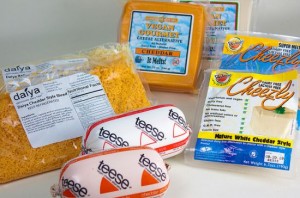 I swoon, you swoon, we all swoon for ooey gooey cheese… so what’s all this talk about eating vegan versions? How on earth could anything compare to the pure satisfying delight that is coagulated, acidified, pasteurized, aged milk?
I swoon, you swoon, we all swoon for ooey gooey cheese… so what’s all this talk about eating vegan versions? How on earth could anything compare to the pure satisfying delight that is coagulated, acidified, pasteurized, aged milk?
Pizza would be nothing without its mozzarella-y canvas… macaroni could easily be a mere mockery without a liberal dousing of emulsified cheddar sauce… Reuben sandwiches complete snoozeville without the pleasing oomph afforded by Swiss… and let’s not even get started on how any of us could possibly wrap our minds around a cheese plate robbed of its lush brie or tangy goat morsels. So… the conventional cheese that we all know and love? There really is no suitable replacement. It would be like saying that chocolate dipped strawberries taste just as good when they’re crowned in melted carob chips (um, that would be a helllll to the no).
Or maybe not. Ready for a surprising and far more nutritionally sound reality check? Vegan cheese – in which the animal based enzymes and milk are entirely absent from the standard recipe – is not only an ever-popular alternative for those who pursue a plant based lifestyle, it also happens to be popping up in the shopping carts of a larger cross section of the population who purposely seek out healthier dietary choices or even fancy themselves as inquisitive foodies. Without its two key animal-derived ingredients, it’s hard to imagine an alternative cheese actually being palatable, and yet it really is. (If you occasionally indulge in frozen convenience foods, you’ve probably consumed it many times without even knowing it.)
What Makes Vegan Cheese Different?
Instead of relying on dairy based ingredients (or anything derived from an animal, for that matter, rennet included), vegan cheeses are created entirely from plant foods — a huge plus for anyone who makes a conscious effort to tread a little lighter on the planet. That also means that they’re completely absent of antibiotics and hormones. Generally speaking, this plant-based factor also bestows more nutritional benefit to that which is not typically an artery-friendly food to begin (think omega fatty acids, heart-healthy fats and probiotics), particularly when the varieties are consumed in their raw form.
What Basic Ingredients Are Used To Make Vegan Cheese?
Depending on the brand and recipe used, plant-based cheese can be made with everything from soy protein (used in shiny-slick rubbery varieties), solidified vegetable oil (such as coconut, palm and/or safflower), nutritional yeast and thickening agar flakes to nuts such as cashews/macadamias/almonds, tapioca flour, natural enzymes, vegetable glycerin, assorted bacterial cultures, arrowroot and even pea protein.
Is There Anything About Vegan Cheese That’s Unappealing?
If you’re a cheese purist, it may be hard to get past the fact that certain varieties may lack a compatible visual appearance, texture or taste to their conventional counterparts, often leaving behind a greasy and even grainy feel in the mouth. Another bone of contention – some types simply just don’t melt the way that you might hope, especially brands made with rice. However, we’re all over the moon for Daiya since it mimics the mouth feel, appearance and flavor of mainstream cheese so impressively. Some critics suggest that plant-based cheeses should really be incorporated into a dish with multiple ingredients rather than snacked on straight out of the package, while others insist that homemade versions or artisan recipes by the likes of Dr. Cow are the shining dairy-free stars that deserve a front-and-center place on your appetizer table.
Oh… there’s just one additional drawback to bear in mind. Some vegan cheeses can be highly processed, quite like a standard package of American Cheese or a veggie burger for that matter, so while they may seem healthier in theory, creating a dairy-like product with nothing but plants requires a great deal of tweaking at the factory.
To Vegan Cheese or Not to Vegan Cheese…That is The Question.
Life’s too short to wonder what plant based cheese alternatives really taste like, so get thee to a natural food store and give ’em a whirl. Actually, you can probably even find them at your favorite conventional market (now that vegan livin’ has hit the mainstream, there are even online coupons available to make your culinary leap of faith even more justifiable). Scaredy cats may be pleasantly surprised when they test drive Tofutti’s Better Than Cream Cheese, a dead ringer for the mainstream bagel-worthy schmear any old day despite its soy-based roots (maybe even better!). Other popular, tastebud-pleasing brands to consider include easier-to-melt Teese Mozzarella Vegan Cheese, Vegan Gourmet’s perfectly palatable line of sliceable and spreadable cheeses or Heidi Ho Organics’ diverse collection of veggie cheeses for every whim and culinary application. When in doubt, purchase the basic ingredients and make your own fresh DIY batch, from peppered cashew ‘goat’ cheese and raw slicable hard cheese to sharp ‘cheddar’, harrissa cashew and almond ‘feta’ cheese — you’ll go nuts for them, I promise!
Author: Elizah Leigh/ Image: veganbaking.net


